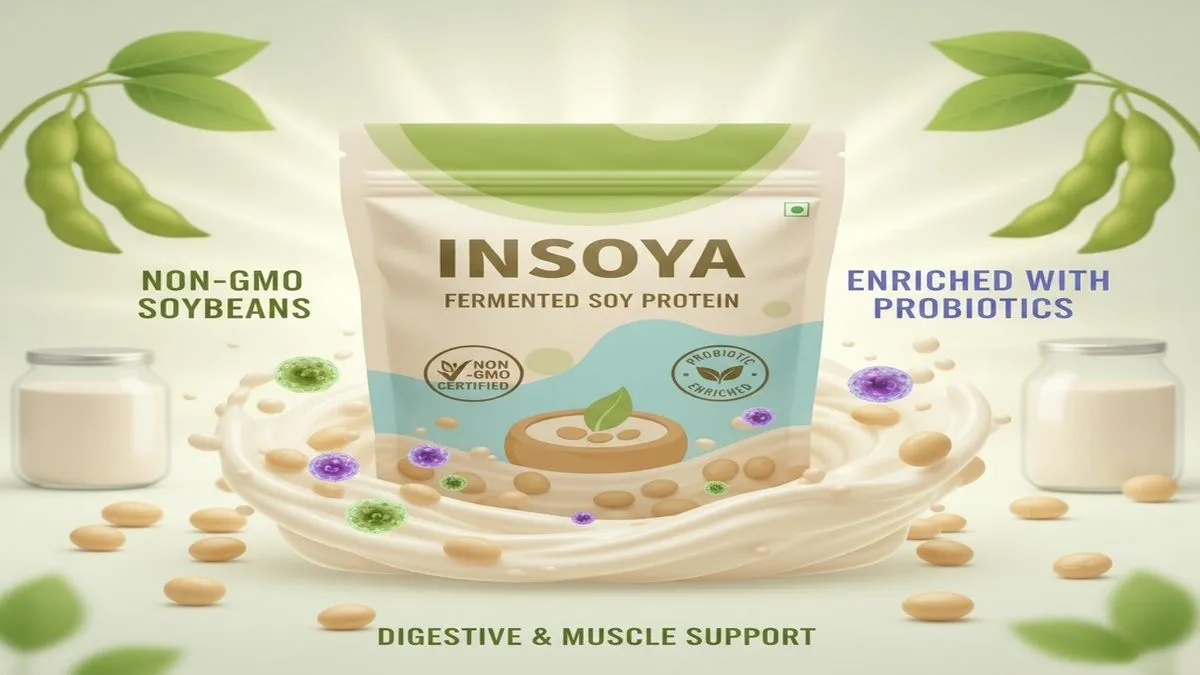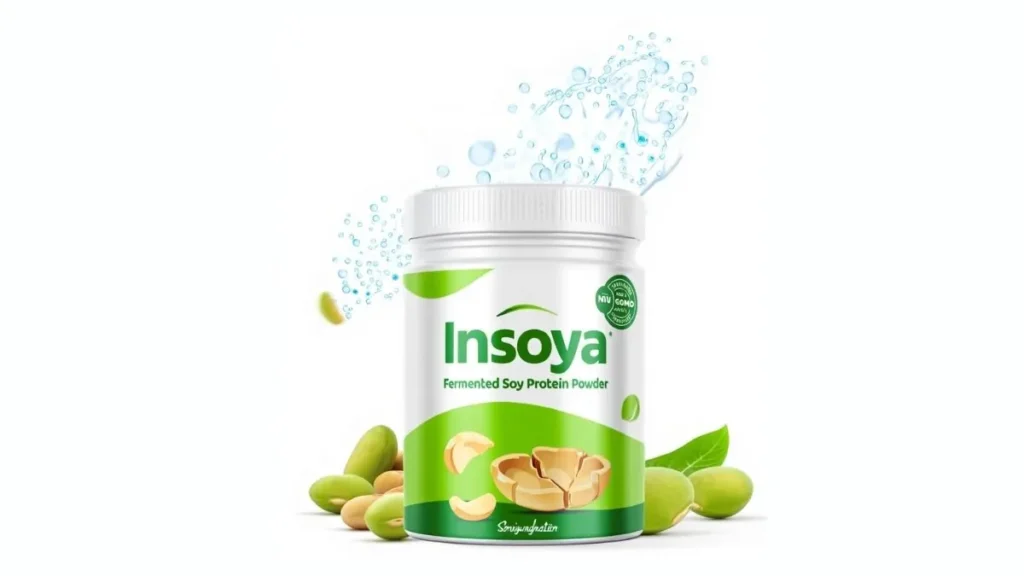HEALTH AND FITNESS
Insoya: Fermented Soy Protein for Better Nutrition

Insoya is a fermented soy protein powder made from non-GMO soybeans and enriched using probiotic cultures. Unlike conventional soy protein, which can sometimes cause digestive discomfort or reduced nutrient absorption, Insoya undergoes a controlled fermentation process that enhances its digestibility, bioavailability, and nutritional value. The result is a complete plant-based protein source that supports muscle growth, tissue repair, and overall health, while being both sustainable and allergen-conscious.
Table of Contents
The Science Behind Insoya’s Fermentation Process
At its core, Insoya’s nutritional superiority stems from fermentation, a natural biological process in which beneficial microorganisms (such as lactic acid bacteria or Bacillus subtilis) partially break down the complex compounds in soybeans. This process alters the structure of soy protein, reducing antinutritional factors like trypsin inhibitors and phytates, which otherwise hinder nutrient absorption.
Nutritional Composition of Insoya
Insoya maintains the complete amino acid profile inherent to soy protein, providing all nine essential amino acids that the human body cannot produce on its own. This makes it comparable to animal-based proteins in terms of biological value.
A typical serving of Insoya offers:
- High-quality protein: Typically, around 20–25 grams per serving
- Low fat and cholesterol-free: Ideal for heart-conscious individuals
- Rich in isoflavones and antioxidants: Supporting cellular protection
- Source of essential minerals: Including calcium, iron, and magnesium
Moreover, because the fermentation process increases the bioavailability of nutrients, the body can utilize these amino acids and micronutrients more effectively, supporting muscle repair, recovery, and immune function.

Digestibility and Gut Health Benefits
One of the most notable advantages of Insoya lies in its digestive friendliness. Traditional soy proteins can be challenging to digest for some people due to oligosaccharides and enzyme inhibitors. Through fermentation, these compounds are primarily broken down, leading to a smoother digestive experience.
Additionally, the probiotic cultures used in Insoya contribute to gut microbiome health. Research shows that probiotic fermentation can produce bioactive peptides and short-chain fatty acids (SCFAs), both of which are linked to improved gut barrier function, reduced inflammation, and better nutrient absorption.
This makes it particularly suitable for individuals with sensitive digestion, athletes recovering from intensive training, and those seeking sustainable protein alternatives.
Role of Insoya in Muscle Growth and Recovery
Protein is essential for muscle synthesis, and Insoya’s amino acid profile ensures that all necessary building blocks, particularly branched-chain amino acids (BCAAs) like leucine, isoleucine, and valine, are available to support muscle repair and growth.
Fermentation enhances the bioefficacy of these amino acids, enabling faster absorption and utilization by muscle tissue. Studies in sports nutrition suggest that plant-based proteins, when properly fermented and optimized, can perform on par with whey or casein proteins in promoting lean muscle mass and post-exercise recovery.
Environmental and Ethical Sustainability
Beyond its nutritional merits, Insoya embodies the principles of sustainable nutrition. It is derived from non-GMO soybeans, ensuring genetic purity and reducing dependency on chemically modified crops.
Compared to animal-based protein production, soy protein requires significantly less land, water, and energy, while producing fewer greenhouse gases. Furthermore, the fermentation process itself is eco-friendly, generating minimal waste and often utilizing naturally occurring microbial strains.
For individuals concerned about the environmental footprint of their diet, Insoya presents a responsible and ethical choice that aligns with global sustainability goals.
Comparison with Other Protein Sources
| Protein Source | Digestibility | Amino Acid Profile | Allergenicity | Environmental Impact |
| Insoya (fermented soy) | High | Complete | Low | Low |
| Whey protein | Very high | Complete | Moderate (milk-based) | Moderate |
| Pea protein | Moderate | Nearly complete | Low | Low |
| Unfermented soy protein | Moderate | Complete | Higher | Low |
Applications in Daily Nutrition
Insoya’s versatility makes it suitable for a wide range of dietary applications. It can be incorporated into:
- Smoothies and shakes for post-workout recovery
- Baked goods to boost protein content
- Breakfast cereals and granola for added satiety
- Plant-based meals such as soups, sauces, or protein bars
Because it dissolves easily and has a neutral flavor profile, Insoya adapts well to both culinary and functional uses, making it ideal for consumers looking to enhance their protein intake naturally.
The Role of Probiotics in Enhancing Nutrient Value
The probiotics used during Insoya’s fermentation, commonly include strains like Lactobacillus plantarum or Bacillus coagulans, play a vital role beyond improving digestion. They also help synthesize bioactive compounds, increase antioxidant capacity, and may even aid in immune modulation.
This connection between probiotic fermentation and protein metabolism represents a growing field of nutritional biotechnology, emphasizing how the microbiological transformation of food can unlock new levels of health benefit.

Scientific and Clinical Perspectives
Recent research supports the growing interest in fermented plant proteins as functional foods. Studies indicate that fermentation improves protein digestibility-corrected amino acid scores (PDCAAS) and enhances the bioavailability of essential nutrients. Additionally, probiotic fermentation has been shown to produce short-chain fatty acids (SCFAs), which contribute to improved gut health and immune regulation.
Insoya aligns with these scientific findings by applying fermentation technology to soy protein, resulting in a scientifically validated, nutritionally superior form of plant protein.
FAQs
1. Is Insoya suitable for people with lactose intolerance or dairy allergies?
Yes, it is entirely plant-based and dairy-free, making it safe for individuals with lactose intolerance or milk allergies.
2. Can Insoya be used in hot beverages or cooking without losing its nutritional value?
Yes, it remains stable under moderate heat, allowing it to be added to soups, baked goods, or warm drinks without significant nutrient loss.
3. How does the taste of Insoya compare to other plant-based proteins?
It has a mild, neutral flavor with reduced bitterness due to fermentation, making it more palatable than many unfermented plant proteins.
Conclusion
Insoya exemplifies how modern nutrition science can elevate a traditional food ingredient into a highly functional and efficient protein source. By combining non-GMO soybeans with probiotic fermentation, it achieves superior digestibility, nutrient absorption, and sustainability qualities essential for a health-conscious and environmentally responsible lifestyle.
-

 GENERAL8 months ago
GENERAL8 months agoChristofle – For Those Who Dream of Family Heirloom Silver
-

 SPORTS10 months ago
SPORTS10 months agoDiscover the World of Football with Streameast: Watch Your Favorite Leagues and Tournaments
-

 GENERAL2 months ago
GENERAL2 months agoUncovering the World of кинокрадко: The Dark Side of Film Piracy
-

 GENERAL5 months ago
GENERAL5 months agoATFBooru: Anime, Gaming, and Subculture Imageboard























